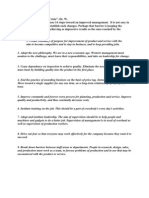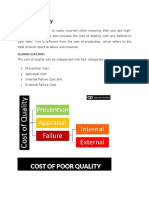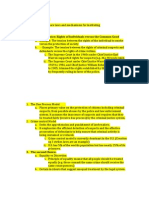Dr. E.deming's Perception On Quality
Dr. E.deming's Perception On Quality
Uploaded by
Ansar Abdal KarimCopyright:
Available Formats
Dr. E.deming's Perception On Quality
Dr. E.deming's Perception On Quality
Uploaded by
Ansar Abdal KarimOriginal Description:
Original Title
Copyright
Available Formats
Share this document
Did you find this document useful?
Is this content inappropriate?
Copyright:
Available Formats
Dr. E.deming's Perception On Quality
Dr. E.deming's Perception On Quality
Uploaded by
Ansar Abdal KarimCopyright:
Available Formats
What was Dr. William Edwards Demings perception of Quality?
Professor William Edwards Deming was known as the Plan-Do-Check-Act cycle inventor. He contributed significantly to Japan and U.S high quality products, innovation and increased economic gain. Efficient planning, implementing, monitoring and control and making improvements defined quality. Deming worked with management and created philosophies to achieve their desired results according to the companys Quality Management Plan.
Ford was one of the first companies that sought help from Deming. Deming questioned the companys culture and the way managers managed. Deming explained that management was contributing to the companys failure. After Ford was presented with the necessary tools, its profits increased. The Ford chairman stated in an interview: We are moving toward building a quality culture at Ford and the many changes that have been taking place here have their roots directly in Dr. Demings teachings. By 1986 Ford became the most profitable American auto company.
Fords success was based on the System of Profound Knowledge. Deming stated that all managers must have this knowledge consisting of four parts
1. Appreciation of a system: understanding the overall processes involving suppliers, producers, and customers (or recipients) of goods and services ( explained below ); 2. Knowledge of variation : the range and causes of variation in quality, and use of statistical sampling in measurements; 3. Theory of knowledge: the concepts explaining knowledge and the limits of what can be known. 4. 'Knowledge of psychology: concepts of human nature.
A 14 Point Management Plan was created to assist in applying these four factors of knowledge which is applicable for education, industry, government and other areas.
Dr. Deming taught that By adopting appropriate principles of management, organizations can increase quality and simultaneously reduce cost. The key is to practice continual improvement and think of manufacturing systems, not as bits and pieces
14 Points of Management theory Dr. Deming offered. The 14 points are: 1. Create constancy of purpose toward improvement of product and service, with the aim to become competitive, stay in business and to provide jobs. 2. Adopt the new philosophy. We are in a new economic age. Western management must awaken to the challenge, must learn their responsibilities, and take on leadership for change. 3. Cease dependence on inspection to achieve quality. Eliminate the need for massive inspection by building quality into the product in the first place.
4. End the practice of awarding business on the basis of a price tag. Instead, minimize total cost. Move towards a single supplier for any one item, on a long-term relationship of loyalty and trust. 5. Improve constantly and forever the system of production and service, to improve quality and productivity, and thus constantly decrease costs. 6. Institute training on the job. 7. Institute leadership (see Point 12 and Ch. 8 of "Out of the Crisis"). The aim of supervision should be to help people and machines and gadgets do a better job. Supervision of management is in need of overhaul, as well as supervision of production workers. 8. Drive out fear, so that everyone may work effectively for the company. (See Ch. 3 of "Out of the Crisis") 9. Break down barriers between departments. People in research, design, sales, and production must work as a team, in order to foresee problems of production and usage that may be encountered with the product or service. 10. Eliminate slogans, exhortations, and targets for the work force asking for zero defects and new levels of productivity. Such exhortations only create adversarial relationships, as the bulk of the causes of low quality and low productivity belong to the system and thus lie beyond the power of the work force. 11. a. Eliminate work standards (quotas) on the factory floor. Substitute with leadership. b. Eliminate management by objective. Eliminate management by numbers and numerical goals. Instead substitute with leadership. 12. a. Remove barriers that rob the hourly worker of his right to pride of workmanship. The responsibility of supervisors must be changed from sheer numbers to quality. b. Remove barriers that rob people in management and in engineering of their right to pride of workmanship. 13. Institute a vigorous program of education and self-improvement. 14. Put everybody in the company to work to accomplish the transformation. The transformation is everybody's job.
Dr. Deming believed that if these above points are not practiced in the organization there will be a decline of revenue, loss of jobs and customer dissatisfaction. He stated that management must be innovative, protect investments, ensure future dividends, and provide more jobs through improved service. Long term commitment to new learning and new philosophy is required of any management that seeks transformation. The timid and fainthearted and the person who expects quick results are doomed to fail.
You might also like
- Online Aptitude Tests For Management TraineesDocument4 pagesOnline Aptitude Tests For Management Traineespeter mulila71% (7)
- Performance EvaluationDocument3 pagesPerformance EvaluationFlorida Banzuelo Villanueva67% (3)
- Deming Quality Management ApproachDocument28 pagesDeming Quality Management ApproachEngr Minna Minerva Aclan100% (1)
- Brigada Eskwela ReportDocument2 pagesBrigada Eskwela ReportElisa Siatres MarcelinoNo ratings yet
- Thematic Unit Lesson Plan FinalDocument30 pagesThematic Unit Lesson Plan Finalapi-398862244No ratings yet
- Demings 14Document3 pagesDemings 14Marie Lyne AlanoNo ratings yet
- 14 Points of DR Deming'sDocument6 pages14 Points of DR Deming'sRabia ZafarNo ratings yet
- Deming 14 PrinciplesDocument2 pagesDeming 14 Principlessaravananpg8697No ratings yet
- William Edward DemingDocument3 pagesWilliam Edward DemingEllaNo ratings yet
- Deming's System of Profound Knowledge: 14 Points For ManagementDocument3 pagesDeming's System of Profound Knowledge: 14 Points For Managementgupta_rk06No ratings yet
- QUALITY GURU-William Edwards DemingDocument4 pagesQUALITY GURU-William Edwards DemingRiya SachanNo ratings yet
- DemingDocument5 pagesDeminglisanna_wayneNo ratings yet
- 1133 - TQM Assignment 1Document2 pages1133 - TQM Assignment 1Shubham KumarNo ratings yet
- W. Edwards Deming's 14 PointsDocument4 pagesW. Edwards Deming's 14 PointsAr'anne ZabalaNo ratings yet
- Chapter 2 Foundations of Quality Management Lecture NotesDocument16 pagesChapter 2 Foundations of Quality Management Lecture Notesmark sanad100% (1)
- Group 1 QUALITYDocument14 pagesGroup 1 QUALITYNIXON MOYONo ratings yet
- Group 1 QUALITYDocument14 pagesGroup 1 QUALITYNIXON MOYONo ratings yet
- The Three Quality Philosophies ComparedDocument12 pagesThe Three Quality Philosophies ComparedRamesh AlhatNo ratings yet
- Cost of QualityDocument24 pagesCost of QualityMuhammad HamidNo ratings yet
- Chapter 3 Gurus of Total Quality ManagementDocument9 pagesChapter 3 Gurus of Total Quality ManagementCALIPDAN, Roselyn D. (Lyn)No ratings yet
- William Edwards Deming: - Statistical Process Control (SPC) Is A Method of QualityDocument11 pagesWilliam Edwards Deming: - Statistical Process Control (SPC) Is A Method of QualitymaxNo ratings yet
- William Edwards DemingDocument10 pagesWilliam Edwards DemingArvind PaulNo ratings yet
- W. Edwards Deming's 14 Points For ManagementDocument1 pageW. Edwards Deming's 14 Points For ManagementApril ReynoldsNo ratings yet
- Quality Gurus and Their ContributionDocument17 pagesQuality Gurus and Their ContributionFayis FYSNo ratings yet
- As 1 TQMDocument8 pagesAs 1 TQMmpimcaNo ratings yet
- Deming PDFDocument2 pagesDeming PDFdeepthiNo ratings yet
- Gurus of TQM Group 6 1Document90 pagesGurus of TQM Group 6 1Coleen Anne PinedaNo ratings yet
- Module 3-TQMDocument17 pagesModule 3-TQMRevenlie GalapinNo ratings yet
- Deming'S 14 Points: (The Guide For Transforming Japan Into A World Power)Document3 pagesDeming'S 14 Points: (The Guide For Transforming Japan Into A World Power)Rami Ibrahim AbbasNo ratings yet
- Dr. Deming's 10 Principles:: The 10 Principles Are As FollowsDocument4 pagesDr. Deming's 10 Principles:: The 10 Principles Are As FollowsSanket SinghNo ratings yet
- MGT 702 - Chapter 2Document58 pagesMGT 702 - Chapter 2adikulaNo ratings yet
- The Total Quality Approach To Quality ManagementDocument30 pagesThe Total Quality Approach To Quality ManagementJohn Ck100% (11)
- TQM GurusDocument18 pagesTQM GurusmbuyaivoneNo ratings yet
- DemingDocument2 pagesDemingAtul PandeyNo ratings yet
- BHMCT Sem Vii TQM Ae 703 Chapter 3Document6 pagesBHMCT Sem Vii TQM Ae 703 Chapter 3Noman AliNo ratings yet
- Definition of Deming's 14 PointsDocument1 pageDefinition of Deming's 14 PointsAnne Marielle de JesusNo ratings yet
- Final Project: Submitted To:-Submitted By: - Abhishek PathakDocument18 pagesFinal Project: Submitted To:-Submitted By: - Abhishek PathakmpimcaNo ratings yet
- Deming 14 Principles of Quality ManagementDocument5 pagesDeming 14 Principles of Quality ManagementSomadutta TripathyNo ratings yet
- W. Edwards Deming's 14 PointsDocument2 pagesW. Edwards Deming's 14 PointsRTSLLCNo ratings yet
- Compare The Ideas of Deming and JuranDocument4 pagesCompare The Ideas of Deming and JuranSjlmasiMohammedNo ratings yet
- Cost of QualityDocument13 pagesCost of Qualityashish RautNo ratings yet
- Mine ManagementDocument20 pagesMine ManagementsunilsinghmNo ratings yet
- Final Assignment IEDocument11 pagesFinal Assignment IEGanggah Devi MurugayaNo ratings yet
- Major Contributors To TQMDocument4 pagesMajor Contributors To TQMRuchika AgarwalNo ratings yet
- List of Prominent Person of Total Quality ManagementDocument3 pagesList of Prominent Person of Total Quality ManagementKim CasianoNo ratings yet
- Total Quality Management - Deming's 14 PointsDocument3 pagesTotal Quality Management - Deming's 14 PointsSoojoo HongNo ratings yet
- Lecture 4: Quality Philosophy and Management Strategies: 1.0.1 William Edwards DemingDocument3 pagesLecture 4: Quality Philosophy and Management Strategies: 1.0.1 William Edwards DemingDiego PulidoNo ratings yet
- Quality Control Assignment 1Document11 pagesQuality Control Assignment 1agathaNo ratings yet
- TQM Module 3Document29 pagesTQM Module 3Jhan Reach EnagoNo ratings yet
- Edward Demings: William Edwards Deming (OctoberDocument17 pagesEdward Demings: William Edwards Deming (OctoberRakeysh CoomarNo ratings yet
- Evolution of TQM Philosophies: Ms. Irum Shahzadi 6Document12 pagesEvolution of TQM Philosophies: Ms. Irum Shahzadi 6Fiaz juttNo ratings yet
- JhielDocument3 pagesJhielSai LeeNo ratings yet
- Chapter 4 P1Document41 pagesChapter 4 P12021812718No ratings yet
- Anderson - Et - Al - 1994 - Deming - Management - Method 5Document1 pageAnderson - Et - Al - 1994 - Deming - Management - Method 5FleuronNo ratings yet
- Deming's 14-Point Philosophy - Strategy Skills FromDocument8 pagesDeming's 14-Point Philosophy - Strategy Skills FromEuropean Leadership School100% (1)
- MNGT 13Document13 pagesMNGT 13monicasheillaNo ratings yet
- DemingDocument30 pagesDemingrajaabid100% (1)
- TQM GurusDocument21 pagesTQM Gurussuneel kumar rathoreNo ratings yet
- Deming's 14-Point Philosophy: A Recipe For Total QualityDocument5 pagesDeming's 14-Point Philosophy: A Recipe For Total QualityAikeen Pelongco LataNo ratings yet
- Group 2: Powerpoint PresentationDocument46 pagesGroup 2: Powerpoint PresentationAj LontocNo ratings yet
- How to Enhance Productivity Under Cost Control, Quality Control as Well as Time, in a Private or Public OrganizationFrom EverandHow to Enhance Productivity Under Cost Control, Quality Control as Well as Time, in a Private or Public OrganizationNo ratings yet
- Lean Analytics: The Ultimate Guide to Improve Your Company. Learn Profitable Strategies to Use Data and Optimize Your Business.From EverandLean Analytics: The Ultimate Guide to Improve Your Company. Learn Profitable Strategies to Use Data and Optimize Your Business.No ratings yet
- The Leadership Shift: How to Lead Successful Transformations in the New NormalFrom EverandThe Leadership Shift: How to Lead Successful Transformations in the New NormalNo ratings yet
- 1996 Blanchard Jones-Alexander Buckley Forneris Psychometric Properties of The PTSD Checklist (PCL) PDFDocument5 pages1996 Blanchard Jones-Alexander Buckley Forneris Psychometric Properties of The PTSD Checklist (PCL) PDFvkyandiNo ratings yet
- Kilmartin Dissertation Worldviews in TransitionDocument334 pagesKilmartin Dissertation Worldviews in Transitionr8b8l100% (2)
- Six Thinking Hats: A Mind Tool For Decision MakingDocument14 pagesSix Thinking Hats: A Mind Tool For Decision MakingZakiaNo ratings yet
- A Semi-Detailed Lesson PlanDocument3 pagesA Semi-Detailed Lesson PlanDARWIN GUNDALENo ratings yet
- Conspiracy TheoriesDocument2 pagesConspiracy TheoriesTim KreutterNo ratings yet
- The Wizard of Fallacy FullDocument14 pagesThe Wizard of Fallacy Fullapi-278585579No ratings yet
- Soft Computing CompleteDocument185 pagesSoft Computing Completesumit tripathyNo ratings yet
- Legal Psychology NotesDocument25 pagesLegal Psychology NotesGrace CarolineNo ratings yet
- The Customer Is Not Always RightDocument11 pagesThe Customer Is Not Always RightyaminshaikhNo ratings yet
- Module 1 AssessmentDocument3 pagesModule 1 AssessmentmoreNo ratings yet
- Maintain Training FacilitiesDocument124 pagesMaintain Training FacilitiesRobiNo ratings yet
- Serengeti 1Document4 pagesSerengeti 1Saikat SarkarNo ratings yet
- Sight-Reading: Andreas C. Lehmann and Reinhard KopiezDocument8 pagesSight-Reading: Andreas C. Lehmann and Reinhard KopiezSTELLA FOURLANo ratings yet
- LT Iii 19 20Document9 pagesLT Iii 19 20Otir OlfNo ratings yet
- Goal Setting Time ManagementDocument23 pagesGoal Setting Time Managementsandyj18No ratings yet
- Car License Plate Recognition With Neural Networks and Fuzzy Log PDFDocument5 pagesCar License Plate Recognition With Neural Networks and Fuzzy Log PDFestherNo ratings yet
- MBA645 SyllabusDocument13 pagesMBA645 SyllabusTutoringSolutionsNo ratings yet
- Paper Presentation - Doc NewDocument12 pagesPaper Presentation - Doc NewMontu DaveNo ratings yet
- History of Petroleum Geology Committee: About AAPGDocument2 pagesHistory of Petroleum Geology Committee: About AAPGBambang RifqiNo ratings yet
- Skylar Joyner Digital TextDocument12 pagesSkylar Joyner Digital Textapi-316629137No ratings yet
- English 9 Q1 TOSDocument2 pagesEnglish 9 Q1 TOSJohnfil Ajeno JamolinNo ratings yet
- 3rd WeekDocument3 pages3rd Weekmanejarosilyn86No ratings yet
- Factors Influencing OrganisationalDocument14 pagesFactors Influencing OrganisationalratnaNo ratings yet
- Ideas, Policy and Politics. Labour Exchanges in Early Twentieth Century BritainDocument49 pagesIdeas, Policy and Politics. Labour Exchanges in Early Twentieth Century BritainAndrés PolaNo ratings yet
- Self Awareness and Values Development: ObjectivesDocument14 pagesSelf Awareness and Values Development: Objectives2D JOVE, Jan Roey, BongatNo ratings yet
- 6 Things That Make A Girl Harder (Or Easier) To Get PDFDocument6 pages6 Things That Make A Girl Harder (Or Easier) To Get PDFRodrigo Mesquita RodriguesNo ratings yet

























































































